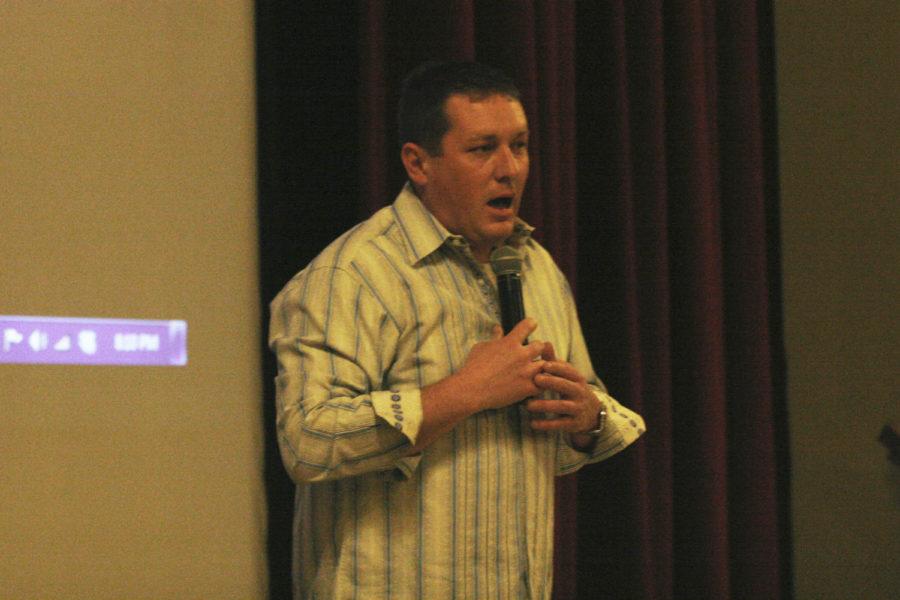Mark Sterner speaks to students to prevent more DUI deaths
Photo: Grace Steenhagen/Iowa State Daily
Mark Sterner relives a past experience of driving while under the influence of alcohol with his friends. Sterner got in a severe accident, which killed three of the four other people in the car with him. He came to Iowa State in the hopes of using his experience to influence the choices of ISU students when it comes to drinking and driving.
April 9, 2013
“How many people in the room ever killed their three best friends when they were drunk and driving a car? My name is Mark Sterner.”
With one hand in the air and one hand clutching the microphone, speaker Mark Sterner silenced the packed Great Hall of the Memorial Union with his account of the night he killed his best friends in a car crash.
“We only had one problem that week,” Sterner said. “Where we were staying out on Sanibel, [Fla.] and where we were drinking out on Fort Myers Beach, was about a 35-40-minute ride. How are we going to get from one place to the other?”
Sterner said he and his four friends, Aaron, 22, Pete, 22, Jim, 23 and Darren, 21, took turns being the designated driver each night, but on the last night, they decided the least-drunk person would drive home.
“At 3 a.m. that morning, my mom received a phone call from a nurse at Lee Memorial Trauma Center,” Sterner said. “The nurse told my mom to come down from Pennsylvania to Fort Meyers, Fla. as fast as she could. The nurse wouldn’t guarantee I’d be alive when my family got there.”
Sterner had a .17 blood alcohol level at the time of the crash. Aaron, Pete and Jim died. Darren and Sterner survived.
“My friends were all .22 and above. So we were right; I was the least drunk person in the car,” Sterner said.
When Sterner woke up two weeks after the crash, he was facing three felony counts of DUI manslaughter with a maximum sentence of 45 years in prison. He was 21 and three months from his college graduation.
“I never realized … that one night on Spring Break, that one night out with my friends, that one decision to drive home, could end up hurting the people I love as much as I have. That I could let them down as hard as I have,” Sterner said.
Sterner wore an orange prison jumpsuit as he told the crowd about the three-year prison sentence he served.
“Out of my prison cell block, the closest sentence to mine was 15 years,” Sterner said.
Sterner said he was beaten and harassed by inmates who didn’t like that he only had three years in prison when they had life.
“Every day when I woke up and put this uniform on and walked out of my cell, I never knew: Would I make it back there to sleep? Would I end up in the prison hospital again? Or is today going to be the day that I die?'”
Sterner said he speaks at about 100 schools across the country every year hoping to prevent others from making the same mistake he made.
“I woke up and my best friends were dead and the worst part is: I’m the reason my friends are dead,” Sterner said. “Because I drove that car that night, I killed my best friends and that’s my punishment. It’s my life sentence.”
Gamma Phi Beta, Alpha Delta Pi and Chi Omega sororities and Tau Kappa Epsilon fraternity put on the event with the help of the Lecture Committee. Sterner was a member of Tau Kappa Epsilon in college.
“I relive the worst night of my life over and over to complete strangers so that nobody else ever has to live with what I live with,” Sterner said.
Courtney Brockman, freshman in apparel, merchandising and design and member of Alpha Delta Pi, went to the April 8, 2013 lecture to support her sorority, but related to the message.
“It’s a good message to think about. When you’re under the influence, you don’t think about the best way to get home; you think about just getting there,” Brockman said. “People should definitely start thinking a little harder.”

















